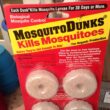Skunks might look cute from far away with their fluffy black and white fur, but nobody wants them setting up camp in their yard. These little critters can spray a smell that travels up to 3 miles away, and they love to dig dens under decks and porches. The good news is that there are plenty of safe, natural ways to keep them away from your property.
Whether you want to buy a ready-made repellent or make your own at home, this guide will help you find the best solution for your skunk problem.
Understanding Skunks
Skunks are night owls. They come out after dark to hunt for food and look for cozy places to build their homes. These animals have an amazing sense of smell that helps them find grubs, insects, and other tasty treats. But here’s the thing: that super-strong nose also makes them very sensitive to certain scents.
What brings skunks to your yard? They’re looking for three main things: food, water, and shelter. Pet food left outside, fallen fruit from trees, bird baths, and dark spaces under structures all look like five-star accommodations to a skunk.
The key to getting rid of skunks is using their powerful sense of smell against them. When they encounter scents they hate, they’ll pack up and move somewhere else.
Top Commercial Skunk Repellents
When it comes to skunk repellent, you have a number of options to consider.
1. Peppermint-Based Sprays
- Plant-based peppermint oil formula repels pests naturally
- Safe to use around pets, kids, and indoor living spaces
- Great for garages, attics, baseboards, and outdoor areas
- Fresh mint scent with long-lasting protection
This is a great choice because it works great and smells pleasant to humans. This spray uses peppermint essential oil as its main ingredient, which skunks absolutely hate but people find refreshing.
One gallon covers 4,000 square feet and keeps working for up to 90 days. You can use it safely around kids and pets, and it won’t harm your garden or the environment. The peppermint scent fades quickly for humans but continues to repel skunks.
To use it, simply spray the areas where you’ve seen skunk activity. Focus on garbage cans, garden borders, and spaces under decks or sheds.
2. Multi-Ingredient Granules
Bonide Repels-All Animal Repellent Granules give you the most bang for your buck. This product mixes dried blood, egg solids, cloves, and garlic oil to create a smell that keeps skunks and other animals away.
The granular form handles rain much better than liquid sprays. One container covers about 2,000 square feet and stays effective for 60 days. Just sprinkle the granules around the areas you want to protect, then lightly water them in.
Fair warning: these granules smell pretty bad when you first apply them. The odor fades for humans after a day or two but continues to bother skunks.
3. Essential Oils
Essentially KateS Peppermint Essential Oil lets you make your own skunk repellent at home. Mix a few drops with water in a spray bottle, and you’ve got an all-natural deterrent that’s completely safe for your family and pets.
This option gives you the most control over ingredients and concentration. Plus, you can use the leftover oil for cleaning, air freshening, or other household needs. The only downside is that you need to mix it yourself each time.
4. Motion-Activated Devices
No products found.
RibRave Ultrasonic Animal Repeller takes a high-tech approach to skunk control. When its motion sensor detects movement, it blasts ultrasonic sound waves and flashing LED lights to scare animals away.
This solar-powered device works 24/7 without any effort from you. It’s waterproof and covers a 26-foot range. The sounds are too high-pitched for humans to hear but very annoying to skunks. Just remember that dogs and cats can hear these frequencies too, so adjust the settings carefully if you have pets.
DIY Skunk Repellent Methods
There are also some great choices if you want to avoid going to the store, and use what you have at home instead!
5. Citrus Peels
Save those lemon and orange peels instead of throwing them away. Skunks hate the acidic smell of citrus fruits, while most people find it fresh and pleasant.
Scatter fresh peels around your garden, under decks, or anywhere you’ve spotted skunk activity. Replace them every few days as they dry out and lose their scent. This method costs almost nothing and makes your yard smell great.
6. Spice-Based Repellents
Hot spices like cayenne pepper, chili powder, and black pepper irritate skunks’ sensitive noses and taste buds. Mix any of these spices with water to create a spray, or sprinkle the powder directly on the ground.
Focus on areas where skunks like to dig or walk. Reapply after rain or watering. Keep some spices handy for cooking too, since you’ll be using them regularly.
Capsaicin, the compound that makes peppers hot, is especially effective. You can buy capsaicin-based animal repellents at garden stores for a stronger concentration.
7. Oil Treatments
Castor oil and vegetable oil work in a sneaky way. When skunks walk through areas treated with these oils, their fur gets greasy and uncomfortable. Since skunks are very particular about keeping their coats clean, this experience makes them want to avoid your yard.
Apply oils directly to grass or soil in problem areas. Focus on spots under decks, around garbage cans, or along fence lines where skunks travel. The oil treatment won’t hurt the skunks but will make them choose a different route.
8. Household Items
Several common household items can help with skunk problems:
Ammonia: Soak old rags in ammonia and place them near skunk dens or travel routes. The harsh smell irritates their sinuses. Replace the rags weekly or after rain.
Predator urine: Fox or coyote urine triggers skunks’ natural fear of predators. You can buy bottles of predator urine online or at hunting stores. Spray it around your property’s perimeter.
Bright lights: Since skunks are active at night, motion-activated lights can startle them away. Solar-powered versions work well and don’t increase your electric bill.
Water sprinklers: Motion-activated sprinklers give skunks an unwelcome shower when they enter your yard. The surprise factor usually sends them running.
Application Tips and Best Practices
Success with skunk repellents depends on putting them in the right places. Focus on key areas like garbage cans and recycling bins since skunks love easy food sources. Create a barrier around vegetable gardens and flower beds where skunks might dig for grubs. Treat areas under decks, porches, sheds, and stairs where skunks might build dens. Look for small paths or trampled areas that show where skunks walk through your yard, and block access points with repellent before sealing them permanently.
Timing matters with skunk repellents. Apply repellents in late afternoon or early evening before skunks become active. Reapply liquid repellents after heavy rain washes them away, and set up a routine to refresh granular repellents every 30-60 days. Start treatments in early spring before skunks establish dens for the breeding season.
Always keep safety in mind when using repellents. Read labels carefully since even natural products can irritate skin or eyes. Store repellents where curious dogs and cats can’t reach them, and don’t apply repellents near vegetable gardens you’ll harvest soon. Wear gloves to protect your hands when handling strong-smelling products like predator urine or ammonia.
Prevention and Habitat Modification
Repellents work best when combined with changes that make your property less attractive to skunks. Start by removing attractants like unsecured garbage by using tight-fitting lids on trash cans and storing them in garages when possible. Bring dog and cat food bowls inside at night, and pick up apples, berries, and other fruit that drops from trees. Fix water sources by draining bird baths at night and repairing leaky faucets or pipes.
Physical barriers can block skunks from accessing their favorite spots. Install half-inch mesh hardware cloth around the base of decks, sheds, and porches to block access. Protect vegetable gardens with short fences that are buried a few inches underground to prevent digging. Fill in any holes or gaps where skunks might squeeze through, and remove brush piles by clearing away leaf piles, fallen branches, and other debris that could hide dens.
Simple landscaping changes make your property less appealing to skunks. Trim overgrown bushes and shrubs that provide cover, and clear out wood piles, old equipment, and other items that create hiding spots. Keep grass short to reduce hiding places and make it easier to spot skunk activity.
Troubleshooting Common Issues
Sometimes skunks are stubborn and don’t respond to your first attempts. If repellents aren’t working, try switching methods from sprays to granules or electronic devices. Combine multiple approaches by using different types of repellents together for stronger effects. You might need to increase frequency by applying repellents more often until skunks get the message. Always double-check that you’ve eliminated all food sources that attracted skunks in the first place.
If skunks have already moved in under your deck or shed, you’ll need a different approach. Wait for them to leave since skunks usually exit their dens at dusk to hunt for food. Install hardware cloth with a one-way flap that lets skunks exit but not return. Apply repellents near den exits to make the area smell terrible and discourage returns. Seal all access points once you’re sure the den is empty, but never trap skunks inside since this creates bigger problems and may be illegal in your area.
FAQ
How long do repellents last? Spray repellents typically last 2-4 weeks, while granular products can work for 30-90 days. Electronic devices work indefinitely as long as they have power.
Are repellents safe for pets? Most natural repellents are safe for pets, but check labels carefully. Avoid letting dogs eat granular repellents, and be cautious with electronic devices that emit sounds pets can hear.
What smells do skunks hate most? Skunks particularly dislike peppermint, citrus, ammonia, predator urine, and hot spices like cayenne pepper. These scents irritate their sensitive noses.
Do mothballs work on skunks? While mothballs can repel skunks, they contain toxic chemicals that can harm pets, children, and the environment. Stick with safer natural alternatives.
How should you apply repellents safely? Wear gloves when handling strong repellents, avoid spraying on windy days, and keep products away from children and pets. Always read and follow label directions.
Conclusion
Getting rid of skunks doesn’t have to involve harmful chemicals or expensive pest control services. With the right combination of commercial repellents, DIY methods, and habitat changes, you can convince these unwanted visitors to find somewhere else to live.
Start with removing food sources and shelter options, then add repellents to areas where skunks are active. Be patient and consistent with your approach. Most skunks will get the hint and move on to more welcoming neighborhoods.
Remember that skunks are just looking for food, water, and safe places to raise their families. By making your property less appealing and more irritating to their senses, you can solve your skunk problem without hurting these animals or the environment.



